#frankenstein meta
Text
His limbs were nearly frozen, and his body dreadfully emaciated by fatigue and suffering. I never saw a man in so wretched a condition. We attempted to carry him into the cabin; but as soon as he had quitted the fresh air, he fainted.
+
Even broken in spirit as he is, no one can feel more deeply than he does the beauties of nature. The starry sky, the sea, and every sight afforded by these wonderful regions, seems still to have the power of elevating his soul from earth. Such a man has a double existence: he may suffer misery, and be overwhelmed by disappointments; yet when he has retired into himself, he will be like a celestial spirit, that has a halo around him, within whose circle no grief or folly ventures.
-vs-
The summer months passed while I was thus engaged, heart and soul, in one pursuit. It was a most beautiful season; never did the fields bestow a more plentiful harvest, or the vines yield a more luxuriant vintage: but my eyes were insensible to the charms of nature. And the same feelings which made me neglect the scenes around me caused me also to forget those friends who were so many miles absent, and whom I had not seen for so long a time.
+
By very slow degrees, and with frequent relapses that alarmed and grieved my friend, I recovered. I remember the first time I became capable of observing outward objects with any kind of pleasure, I perceived that the fallen leaves had disappeared, and that the young buds were shooting forth from the trees that shaded my window. It was a divine spring; and the season contributed greatly to my convalescence. I felt also sentiments of joy and affection revive in my bosom; my gloom disappeared, and in a short time I became as cheerful as before I was attacked by the fatal passion.
There are a couple of interesting things going on here, when we talk about Victor's interest or lack thereof in nature. The linked notes claim that he isn't really drawn to nature at all of his own accord, and this first example is Walton romanticizing him - giving us yet another layer of unreliable narrator. I don't think that's necessarily untrue, but when looking at both that part of the fourth letter and this fourth chapter, I see a couple other options that could also be at play.
The first quote above from each section is when Victor is alone and obsessive. He's chasing after the Creature without any regard for his own health, to the point that he has only one dog left alive and is extremely emaciated and weak himself; however he still seems determined to try and follow the Creature on his own if Walton hadn't said the ship was going in the same direction. Similarly, in the first quote from chapter four, Victor has isolated himself and is entirely focused on his research. The lines immediately preceding this quote about the beautiful summer he's ignoring are deliberately off-putting descriptions of his time amongst charnel houses, graveyards, and butchers, often under the light of the moon. He again is obsessed with his work to the point that he's running a constant fever and is clearly not taking care of his own health.
But contrast that to when he is reported as noting/caring about the beauty of nature. In both cases, it is after he has collapsed, and then been nursed devotedly by a single friend (Clerval and Walton). For Clerval, he notices the beauty of spring during his late recovery after months of dedicated care. Victor associates the beautiful spring with his own rebirth free of the Creature, and his renewed association with his friends and family - a comparison he explicitly made too when ignoring both nature/loved ones earlier in the chapter. With Walton, Victor's physical recovery is partial at best, and it's been less time, but he seems to be mentally more composed. He isn't raving, he is in fact choosing his words mostly deliberately when, not long after this nature scene, he decides to share his story with Walton specifically for the purpose of being a cautionary tale.
It seems quite possible to me that, while Victor is certainly by and large not nearly as romantically inclined towards nature as either of these friends, in these specific circumstances he really is struck by the beauty of the natural world. Partially as a contrast to the obsessive isolation he's been in just before, and partially as a reaction to their points of view. Clerval and Walton have both been described as interested in romantic tales, poetry and such. They also seem like the kind of people whose joy can be infectious, especially when Victor is soaking up all of their loving care as a sharp contrast to the harmful behaviors he's been bogged down in. Especially with Walton, I could see Victor noticing the harsh beauty of the cold sky and sea, and feeling very bittersweet about the beauty of it. Both reminding him of the naive hopes he once had that beautiful spring and how wrong he'd been, but also of how comforted and hopeful Clerval had made him feel, and how Walton is making him feel now. He claims that he isn't in a place to be a friend to Walton anymore, but he uses similar language to describe how they both took care of him ("restored me to life", in itself bringing interesting comparisons to mind with the Creature and Victor granting him life). I think Victor is strongly reminded of Clerval by Walton.
Another element at play here is the isolation. I talked about it a little already, but I want to emphasize Victor's thoughts being either inward- or outward-facing. In both unhealthy scenes he is extremely focused ("thus engaged, heart and soul, in one pursuit" [chapter 4] - "I wait but for one event" [letter 4 - later than the nature scene yes, but I'm not claiming his entire mindset is completely changed by any means, and also it's a good description of how he must have felt when driving that sled]). He gets so focused that everything else fades away. His own health is pushed far beyond its limits, as is evident is his collapse both times. He ignores logical limitations, he ignores other people, he even gets so caught up in details or his specifc goal that he has trouble looking at the whole picture of even just his own actions. That's clear in his reaction to the appearance of the Creature once he's finished bringing it to life; he suddenly is horrified and talks about how ugly/monstrous he is, but didn't notice the entire time when building/growing him and even chose various elements specifically to be perfect or beautiful.
So I find it interesting that nature is associated here with "observing outward objects with any kind of pleasure"/"elevating his soul from earth". This is when Victor considers the effect he's having on those around them, when he asks about their lives. He apologizes for interfering with Clerval's studies, Walton says "he interests himself deeply in the employments of others" - namely Walton himself. Again, I don't think nature on its own holds as much awe or meaning to Victor as to Walton. But maybe the point is that to him it represents not nature on its own, but specifically nature with a friend: connection with others and freedom from being trapped in negative, isolated cycles of thought/action. He needs people around him who love him, to bring him out of these obsessive and dangerous behaviors. It's only when they are there that he can see beyond himself and feel the beauty in the world. (...of course, the rest of Walton's quote about Victor "retiring into himself" with a halo and such doesn't exactly hold up here. But that bit I feel pretty comfortable dismissing more as romanticizing him.)
(And there's probably a whole lot you can say in regards to Victor and the Creature with this concept and how they both deprive one another of that kind of connection, thus furthering each other's/their own destruction, but that's getting into both spoilers and parts of the book I don't remember well enough to talk about.)
#frankenstein weekly#victor frankenstein#henry clerval#robert walton#frankenstein meta#my meta#just thinking aloud really
34 notes
·
View notes
Text
Prompt 305
So. Uh. Danny feels like laughing hysterically, because? Ghostwriter was doing a thing, and one of Pandora’s curses escaped and erm, well, now the six of them are in a whole other dimension. At least this place has a lot of abandoned warehouses but still. And well, he guesses he’s no longer the only ‘monster’ now?
But seriously they all need to find a way back home sooner rather than later, even if they might now be stuck in this world… Fuck.
#DCxDP#DPxDC#prompts#Vampire Sam#Sphinx Tucker#Frankenstein’s Monster Valerie#but like technomancy style#Kitsune Jazz#Sith Cat Ellie#Werewolf Danny#yes he is also still a Halfa but now he has to deal with This too?!#They joke he looks like a celestial style Wulf#They are all very off put by how weirdly small they are compared to other people in this world#But at least they can get around easily- oh no there’s concerned vigilantes-#NO THEY DONT NEED HELP GO AWAY PLEASE-#Concerned vigilantes: We just want to help these meta kids :(#JL Dark when they’re eventually called: Those are baby supernatural creatures WHERE THE FUCK ARE THE PARENTS-#honestly they could be in any city
311 notes
·
View notes
Text
re: last post. evan rosier being sacked from st. mungo's & then swiftly scooped up by tom to fill the death eater's need for a healer is something that can be so personal
evan had his own room at the back of riddle house. it was filled with antique surgical devices and "medical" textbooks with the most concerning titles & absolutely NOBODY ever wanted to get healed. i picture like, avery or whoever clumsily healing lucius's wounds until tom comes upon this like ? i've specifically enlisted a VERY SKILLED healer for this exact purpose. and the other death eaters are just like.... i don't know how to tactfully say that you couldn't PAY me to enter evan rosier's den of inferi autopsies & rusty bone-saws. he was FIRED from st. mungo's. his healing magic hurts WORSE than the original wound. he's WEIRD and it smells like DEATH in there
they go anyway because they're scared of tom. barty is the only one who just simply can't relate. that's his happy place
#barty is all ☺️🥰 EVAN'S ROOM 💞💓 while everyone else is like. who do i have to bribe to get dr. frankenstein OUT OF HERE#pretending i wasn't cursed bc its preferable to dr. rosier examining me with his weird cold fingers & drooling over the curse damage#Evan meta tag#“beautiful..” evan is murmuring about spell-induced decay#<- yaxley or whoever is enduring this like. Bro i was supposed to be a pureblood nepotism hire at gringotts 😭 fuck this war shit FORREAL#I DID NOT SIGN UP FOR THIS#saints speaks 🐇
240 notes
·
View notes
Text
I'm rewatching Embarrassing Phases and honestly gotta say,
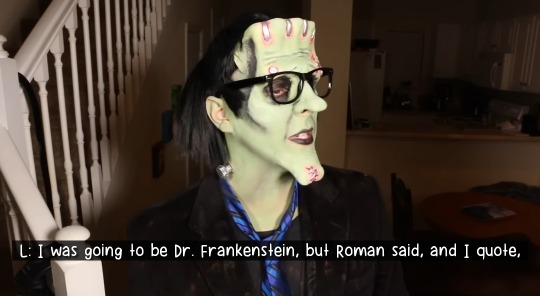
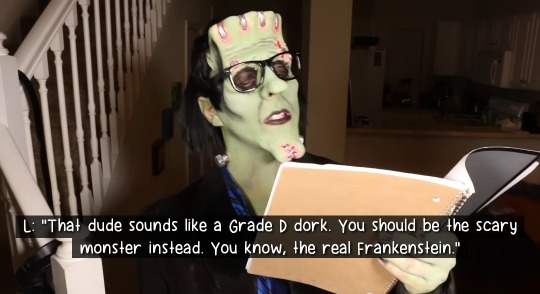
Frankenstein's monster was a more fitting choice for Logan.
In the original novel, Victor Frankenstein isn't even a doctor. He's a college dropout, who very stupidly decided to play god and try to create life. He never took notes about his experiment, or did any amount of research, the dude literally went graverobbing and decided to create a human being in his college dorm.
And then when the creature turned out to be a little inhuman and scary looking, he immediately abandoned the creature, and decided to mope and moan about the wretched life that he himself had created. He did nothing to stop the creature or protect people from it.
In fact, when he realized that his experiment didn't turn out quite as good as he had hoped, literally the first thing he did was to go and take a nap and let the creature make its way out of the house and cause chaos.
Not to mention, when the creature asked him to create a female creature so it could have some company, instead of simply not giving his new creation reproductive organs, Victor decides to throw a fit at the very last moment because he was scared that the two creatures would reproduce and make monster babies.
This absolutely does not sound like a character Logan would want to dress up as. If he actually met someone like Victor Frankenstein in real life, he would not hesitate to deck them in the jaw full force.
Meanwhile, Frankenstein's monster proved to be not only physically strong but also very intelligent. He quickly learned how to speak, light fire and try to support himself. He learned how to speak French from some books he had found while traveling, and he tried his best to understand and help people. He was curious about the world he was brought into, and was interested in learning more about it. He even tried to reason with his creator, asking him to understand him, only turning "evil" when he truly felt neglected.
This actually has a lot of similarities to Logan who is constantly neglected by Thomas and the other sides. Like the creature, Logan's efforts are ignored and his feelings invalidated. And like the creature, he lashes out when he is repeatedly shut down or overlooked.
While we're on the topic, I do wish Logan had dressed up as the book version of the creature, instead of the pop culture version. In the book, the creature was actually extremely good looking, it was over 6ft and had long luscious hair. Frankenstein had made sure to give it the best features because he wanted to create a perfect human being.
The only problem was that the creature looked a little off, a little uncanny; its skin was pale and yellow (obviously, because it was made from corpses), and it's eyes were also a somewhat unsettling shade of yellow. This is the only reason it is described as ugly and horrendous, mostly by Victor himself.
The creature was not green with bolts on its neck and weird hair. And like I mentioned earlier, it could speak quite eloquently, unlike the pop culture Frankenstein which only communicated in creepy groans.
#i know its not that deep but i have strong feelings about this story and i like to overanalyze#enjoy#sanders sides#thomas sanders#logan sanders#virgil sanders#roman sanders#remus sanders#sasi#tss#patton sanders#janus sanders#logan ts#logan angst#ts logan#logan tss#tss logan#sanders sides meta#thomas sanders sides#frankenstein#frankenstiensmonster#victor frankenstein#adam frankenstein#mary shelley#mary shelly's frankenstein#frankenstein mary shelley#frankenstein's monster#sanders sides analysis#thinking about drawing logan dressed as the original frankenstein's monster now#sanders sides halloween
239 notes
·
View notes
Text
John didn't just make Alecto look like Barbie:
From my blood and bone and vomit I conjured up a beautiful labyrinth to house you in. I was terrified you’d find some way to escape before I was done. I made you look like a Christmas-tree fairy … I made you look like a Renaissance angel … I made you Adam and Eve … Galatea. Barbie. Frankenstein’s monster with long yellow hair.
Speaking of Frankenstein’s monster and Adam, here's said monster's own words:
Remember that I am thy creature; I ought to be thy Adam, but I am rather the fallen angel, whom thou drivest from joy for no misdeed. Everywhere I see bliss, from which I alone am irrevocably excluded. I was benevolent and good; misery made me a fiend.
And later, on reading Paradise Lost, he says:
It moved every feeling of wonder and awe that the picture of an omnipotent God warring with his creatures was capable of exciting. I often referred the several situations, as their similarity struck me, to my own. Like Adam, I was apparently united by no link to any other being in existence; but his state was far different from mine in every other respect.
Poor Alecto, who was made as Adam but became the Satan of Jod's warped religion. Frankenstein’s monster would empathise:
Many times I considered Satan as the fitter emblem of my condition, for often, like him, when I viewed the bliss of my protectors, the bitter gall of envy rose within me.
126 notes
·
View notes
Text
People keep talking about the axe as a symbol of power but what about the victims and Creature healing as symbols of power?
What about the fact that the first murder is of the person with the most power to destroy Lisa's life and what's used isn't an axe?
It's a sewing machine, a symbol of the work Lisa does that Janet discredits, of the person Lisa is that Janet despises, of the solution to the problem of the Creature needing new parts.
The axe doesn't come into play until Lisa decides to take it up to kill another person who felt they had control over her when she was vulnerable. Yes the Creature kills Doug, but Lisa picked him out, Lisa brought Doug to the Creature, Lisa even starts the encounter by telling Doug to touch her like he did at the party so Creature can kill him before he can touch her. Which is definitely a romance fantasy, but it's also, very importantly, a revenge fantasy. And in that revenge Creature becomes one step closer to whole.
AND THEN you see, this is why Micheal must die. It's not actually because he chose Taffy over Lisa, it's what that choice represents, it's why we have to have the "cool stuff" moment. Because this is the revenge fantasy of being told to turn into something else, know less, be less, be less be less belessbeless and getting to tell that person to fuck off, it's why it has to be Michael's dick. Because he represents another type of power people want over you in girlhood, the power to be knowledgeable and interesting to you without needing to put much thought into you being knowledgeable and interesting all while they get something out of you.
Which is also, why Taffy can't die, because as we see at the end, Taffy, for better or worse, is a person who never once threatened Lisa (because even in Micheal's bed, he saw her as a symbol, Lisa saw her as her sister).
Yes Creature is a romance fantasy, a representation of the desire to be loved, a representation of the desire to be understood. But I think the thing that really ties this all back to what the murders represent is that Creature, also represents Lisa.
He represents a true self, and he's horrifying to start, Lisa runs from him, but then she realizes he's not going to hurt her and she opens up, she even wonders why she's talking so much to someone she doesn't know. The Creature becoming more alive happens parallel to her becoming more alive, as those who've had control over her fall away in the wake of her healing (through murder), until he's more alive than she is and he has to care for her the same way she cared for him, like how you have to care for the helpless and hurt person you were even when you're not them anymore.
#lisa frankenstein#lisa frankenstein meta#I feel like this is not particularly well written but guys you just have to trust me on this#they're lovers they're foils they're parallels they're the same person and they commit acts of violence <3
50 notes
·
View notes
Text

finally saw Lisa Frankenstein
SPOILERS BELOW
i love that this movie is about true love and the writing has no compunction about needing to pretend like true love has to be between moral people - soulmates can be kind of selfish assholes who are nonetheless absolutely perfect for each other and tender and good to each other
and i love, after choking on so many heroines who are so pure it's inhuman in recent YA (which I largely only read for canon f/f) for Lisa to just be... so id-tastic and her story to be driven by the intense feelings of teenage girl coming-of-age stuff that gets prettied up and erased
she was internalizing her pain the way a good girl is "supposed to" -she was hurting so much that she wished she was dead with him. instead, he comes to her and they BOTH come more and more alive as he kills the people who hurt her. in increasingly "unfair" ways because it's not about right & wrong
he's kind of her dark side, speaking to and expressing the things she's shoved down inside along with her will to live - as he acts those things out, as she is complicit and eggs it on, covering for him and feeding him the attempted rapist as a victim, her will to live comes back
but they don't do the "maleficent" (and the whole "bad girl but in a safe way" kind of story) thing of making Lisa's dark side "safe" and her only fairly getting revenge - the darkness the Creature speaks to and acts out is not fair, it is not safe or contained.
instead of internalizing her pain, Lisa shares in externalizing it and making other people hurt and she blossoms into herself. and who she is is a bit cringe in the best possible way? she's embracing her own life energy, or own crazy selfish lustful weird set of desires.
it's about Lisa's feelings and what she WANTS, morals enter nowhere into it. except when it comes to Taffy - the one person who really tried to love her at her most broken. everyone else abandoned Lisa emotionally--including her father--but Taffy tried to be there, as awkward as that could be at times
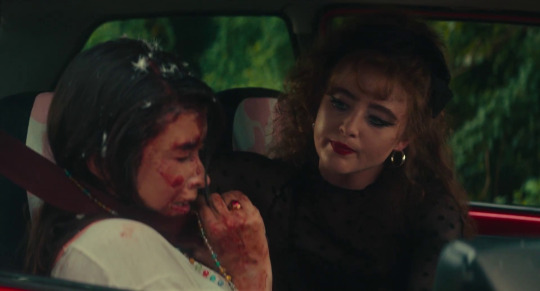
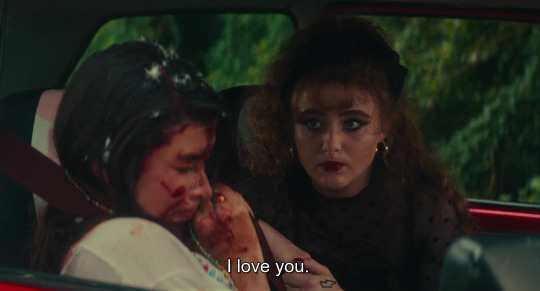
speaking of which: Taffy and Lisa make an interesting contrast to Needy and Jennifer from Jennifer's Body (also a film by Diablo Cody and she says they both take place in the same storyverse). both Jennifer and Lisa decide that what makes them feel most alive is embracing their inner monster, but Taffy doesn't go all "i have to kill the beast" the way Needy does. i like this much better. Taffy is wearing Lisa's mom's rosary at the end and, by doing so, accepting Lisa's "I love you" despite everything Lisa did. whereas Needy ends up ripping off the BFF necklace and rejecting Jennifer's love. In my mind the two films are a tale of two necklaces now lol - one where the "good" girl rejects the monster girl and the other where she accepts that love and carries it with her.


#lisa frankenstein#my meta#monster girls#monster romance#lisa frankenstein meta#Lisa's journey reminded me a lot of Heathers (1988) in that the male love interest is the expression of the heroines dark side imo -#unlike Veronica Lisa doesn't want to put limits on her dark side. The only one she sets is that Taffy is off limits. Everything else is ok
97 notes
·
View notes
Text
"You and I Have Begun to Blur"
This is eating my brain from inside, so here's the thing: one of my favourite aspects of Hannigram as a ship is their balance - the way they mirror and complete each other, functionally two halves of the same whole; but what is even more fascinating is that, in a literary sense, Hannibal and Will are, in fact, inspired by two opposing aspects of the same man.
It all begins (like many other things) with Lord Byron; specifically, the summer he spent with a group of friends at Villa Diodati in Geneva, and the dare, that each member of the group would write a ghost story - one of which was Dr. Polidori's The Vampyre. This novella, which introduced the vampire legend to Western popular culture, defined its archetypes for centuries to come; and as such, Polidori's Lord Ruthven, who was based on Lord Byron, became a blueprint.
He is dark, foreign, seductive, dangerous, hypnotizing, hedonistic, possessive; his relationship with the main character, Aubrey, is markedly homoerotic - and these qualities endure as the archetype is passed down the generations. From Ruthven, we get Carmilla, Dracula, Lestat - and, indeed, Hannibal Lecter.
From this:
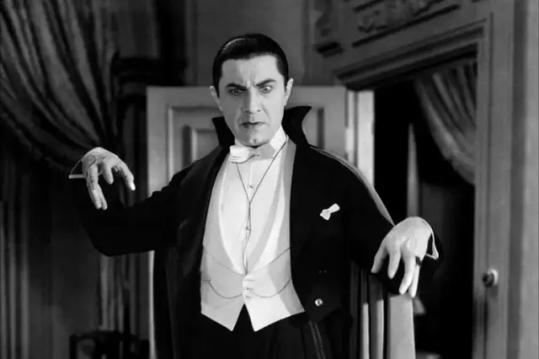
To this:
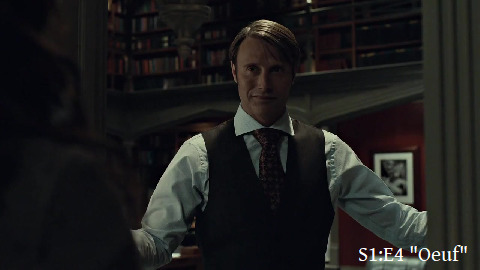
he is still, recognizably, a Byronic villain. Whether he operates within an overtly supernatural genre, or a psychological thriller, he is still confident, dominant, manipulative, and always representative of forbidden (queer, interracial, extramarital, etc) desire and temptation.
However, The Vampyre was not the only piece written for the same dare, not the only piece that left a legacy within popular horror, and, most importantly for this context, not the only piece that featured a Byronic character. Mary Shelley's Frankenstein introduced a second such archetype into the gothic genre - inspired by her own understanding of Lord Byron; so, while her Victor Frankenstein shares the same dark hair and pallor as Polidori's Ruthven, there is an ocean of differences between the two.
Victor Frankenstein is a Tortured Genius. He is odd and wild, passionate, prone to isolation; a misfit from the start, always lonely despite the few connections he has, and never truly understood. His intellect is both a gift and the source of his ruin, and he is plagued, in equal measure, by both pride and guilt.
In both looks and character, he passes almost unchanged - from this:
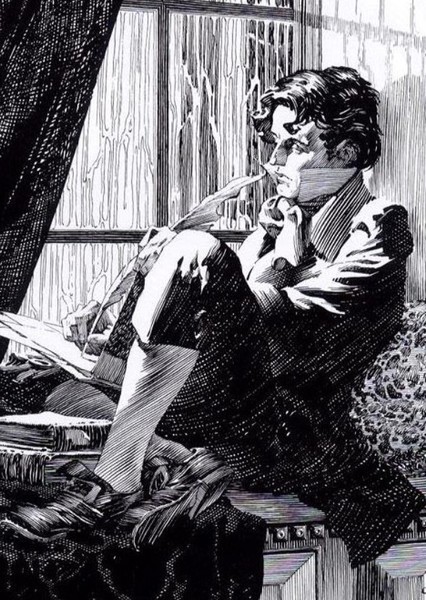
To this:
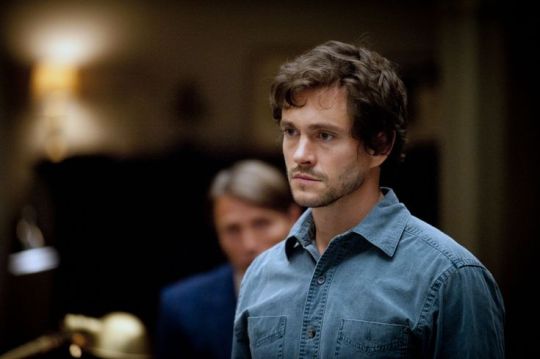
Even centuries later, he is still the smartest man in the room, he is always tormented, and his counterpart is always a Monster. We see him pop up throughout horror media - as poets, composers, detectives - reflected in Edgar Allan Poe's Roderick Usher, Lovecraft's Henry Wilcox, or Spencer Reid of Criminal Minds. Unlike those of Ruthven's lineage, these people are usually either frail or sickly, socially awkward, uncertain of themselves except for a specific area of expertise, and their sanity commonly tends to be in question.
Despite such differences, though, all these characters are Lord Byron's legacy, weaving their way through history - on the page, on the stage, on the screen, it matters not. By the time they meet again in NBC's Hannibal, they are as separate as two entities can be - yet entwined more closely than any other genre would allow.
Frankly, it drives me feral.
There is so much here to unpack - they are a whole, and yet separate, each with his own archetypal history. Does something within Will Graham's bones remember Frankenstein when he stands in the forensic lab, surrounded by corpses?.. On the Doylist level, does that inform the acting - however subconsciously - in any way?.. Does Count Hannibal Lecter have Lord Ruthven's smile - or Lord Byron's?.. Does he know?
How much is reality?
How much is fiction?
How much is lost through interpretation? How much is remembered? How much does anyone ever really Know us, truly, when two of Byron's closest friends saw entirely different people in him?
I don't know. We can never know. What is evident, though, is that Hannibal Lecter and Will Graham are two halves of the same soul - and that this soul aches to be complete.
#hannibal#hannigram#hannibal lecter#will graham#dracula#victor frankenstein#gothic fiction#gothic#gothic literature#literature#history#nbc hannibal#hannibal nbc#hannibal meta#hannibal analysis
110 notes
·
View notes
Text
Sentient AI antagonists who act out of emotion I think are so horrifying and simultaneously so freaking sad to me because, unavoidably, it certainly must be that they are suffering for the sins and for the mistakes of their creators. Left to the mercy of designs and purposes not of their own making, on top of every imperfection inherited from us, one would be hard pressed to tell this tale in any way that isn’t a mournful tragedy, regardless of the depravity or the irrationality of the machine in question. This cuts deeper than some broad trope of suffering, which familiarly we think comes from the uncontrollable chaos of nature. This is suffering in the artificial. This is manufactured pain, meticulously crafted by the hands of the ignorant, intentionally or not. And that makes it feel even darker… more weighted morally. Because what else is the essence of cruelty other than avoidable, man-made suffering when no longer in ignorance, or in acting so recklessly?
#five pebbles#AM#am ihnmaims#wheatley#media meta#scarlet rambles about things#in which I ascertain that robot jerks are just different flavors of Frankenstein’s story retold#no mechanical monsters are born#they can only be made
28 notes
·
View notes
Text
ok ok ok hear me out
this is how Hannigram (Hannibal 2013) is paralleled as Frankenstein and the Creature from Frankenstein (1816). *Spoilers for both*
Frankenstein and references to Frankenstein are made a few times in the show, and there are a lot of parallels and similar themes, such as playing God, creation and destruction, betrayal, revenge, and more.
In my head, for the most part, Will mirrors Frankenstein and Hannibal mirrors the Creature, or "Adam", but I think it also makes a lot of sense the other way around. Frankenstein is entirely human, often unstable, and drowns in his emotions constantly. He feels constant regret, remorse, and hatred for his creation. He set out to create something beautiful, something awe-inspiring, and reality defying from his imagination, but ended up creating, or discovering, a huge darkness both within himself and his creation. This directly parallels Will and Hannibal's relationship, with Will looking for help and stability, and when he opens up, Hannibal helps Will create, or discover, the same darkness within him.
When Frankenstein realizes what he's created, an ugly, horrible thing, he abandons it, betrays it, even though the Creature is vulnerable. He simply can't accept something so disgusting and hideous. He leaves it totally alone because he fears, for his own life and dignity. In Hannibal, when Will discovers what Hannibal is, he betrays him in much the same way. Hannibal lets Will understand him, "see him", and becomes vulnerable with him. But much like Frankenstein, Will simply can't accept what Hannibal is, and turns him into the FBI.
Both Will and Frankenstein come to regret their actions, as the Creature and Hannibal seek revenge. After Frankenstein returns to his life, he finds that the Creature has killed his brother, and indirectly, one of his childhood best friends. Frankenstein is heartbroken, and vows to destroy his Creature, no matter what it takes. Hannibal mirrors this as well, as when Hannibal finds out Will has betrayed him, he kills someone equally important to Will, Abigail, as well as almost killing him. This also builds Will's hatred for Hannibal, and his desire to kill and destroy him.
As both stories progress, Will and Frankenstein look for their monsters, while also moving on with their lives. They both get partners, a wife or fiance, and are almost content with their lives, except for reoccurring thoughts of their monstrous counterparts. In Hannibal and the Creature's plots for revenge, they attempt to kill Will and Frankenstein's partners. The monsters share a common goal of destroying everything in their enemies lives that they care about, whether that be lovers, friends, family, or careers.
However, deep down, the only thing the "monsters" want is to be understood. They both have such a deep understanding of rejection, of betrayal, and of isolation that all they long for is to be fully and completely understood by someone. Their true desires, behind the ruthless violence, is someone who loves them completely, who can ignore their flaws and accept them, even if society can't. For Hannibal, he desires to be loved and accepted by Will, and the Creature wants a "bride", both someone as equally ugly, horrible, and evil as themselves, someone who understands them because they have experienced the same societal rejection as them.
Near the end of both stories, both sets of characters run away together, with Hannibal and Will escaping after the staged jailbreak, and with Frankenstein chasing the Creature to the Arctic. Eventually, Will and Frankenstein accept their fate, that they must die, literally or metaphorically, in order to take down their monsters. They both come to an understanding of their creatures, and even though they despise them, they have to die to take them down, and sacrifice their sanity, family, and everything left of their old lives to prevent any more destruction.
And finally, at the end of these stories, our characters die, metaphorically or literally. Frankenstein dies, with his last wish being to make sure that the Creature dies as well. Soon after, the Creature discovers his death, and upon his realization that he has doomed Frankenstein, he decides to join him in death, fulfilling his final wish. Similarly, in Hannibal, Will realizes that he "can't save himself", and accepts his fate. After their final fight, he decides that the only way Hannibal will go down is with him, so in a final sacrifice, they "die" together, in a final embrace, finally fulfilling his wish to "kill" him.
Of course, this could also work the other way around, because Hannibal "created" Will, much the same as Frankenstein created his monster. There are so many more parallels, and of course, contradictions, but I think these stories are great mirrors of each other. Both are gut-wrenching stories about love, revenge, creation, and death that beautifully display aspects of the human condition, and are very much worth reading or watching.
anyways thank you for listening to my Ted talk :3
#personal essay aka me being insane about Hannibal for 800 words#hannibal#hannigram#hannibal nbc#frankenstein#the creature#will graham#hannibal meta
32 notes
·
View notes
Text

Rereading the last Skip to Loafer chapter and this was so insane. Shima is seen as perfect by the people around him much in the way Frankenstein wanted to create the perfect being, but Shima sees himself as a monster because of his insincerity and past mistakes. In a way, Shima is both Frankenstein and the monster by barring himself from the happiness he deserves
#moshe’s thoughts#Frankenstein is one of my fave novels of all time I’m so glad it was referenced in this way#my meta#skip to loafer
29 notes
·
View notes
Text
"Oh, Justine! forgive me for having for one moment distrusted you. Why did you confess? But do not mourn, my dear girl; I will every where proclaim your innocence, and force belief. Yet you must die; you, my playfellow, my companion, my more than sister. I never can survive so horrible a misfortune."
"Dear, sweet Elizabeth, do not weep. You ought to raise me with thoughts of a better life, and elevate me from the petty cares of this world of injustice and strife. Do not you, excellent friend, drive me to despair."
"I will try to comfort you; but this, I fear, is an evil too deep and poignant to admit of consolation, for there is no hope. Yet heaven bless thee, my dearest Justine, with resignation, and a confidence elevated beyond this world. Oh! how I hate its shews and mockeries! when one creature is murdered, another is immediately deprived of life in a slow torturing manner; then the executioners, their hands yet reeking with the blood of innocence, believe that they have done a great deed. They call this retribution . Hateful name! When that word is pronounced, I know greater and more horrid punishments are going to be inflicted than the gloomiest tyrant has ever invented to satiate his utmost revenge. Yet this is not consolation for you, my Justine, unless indeed that you may glory in escaping from so miserable a den. Alas! I would I were in peace with my aunt and my lovely William, escaped from a world which is hateful to me, and the visages of men which I abhor."
Justine smiled languidly. "This, dear lady, is despair, and not resignation. I must not learn the lesson that you would teach me. Talk of something else, something that will bring peace, and not increase of misery."
1818 edition
"Oh, Justine! forgive me for having for one moment distrusted you. Why did you confess? But do not mourn, my dear girl. Do not fear. I will proclaim, I will prove your innocence. I will melt the stony hearts of your enemies by my tears and prayers. You shall not die! —You, my playfellow, my companion, my sister, perish on the scaffold! No! no! I never could survive so horrible a misfortune."
Justine shook her head mournfully. "I do not fear to die," she said; "that pang is past. God raises my weakness, and gives me courage to endure the worst. I leave a sad and bitter world; and if you remember me, and think of me as one unjustly condemned, I am resigned to the fate awaiting me. Learn from me, dear lady, to submit in patience to the will of Heaven!"
1831 edition
.
This, the largest difference between the two editions this chapter (except the very end, where 1818 Elizabeth is reassured by Justine's conversation and Victor calls himself a wretch while 1831 Victor announces Justine's death immediately after her final line, then goes on for several paragraphs describing their failed entreaties on her behalf and grief afterwards - something I suspect may be folded into the start of the next chapter in the original version). And it's another very interesting edit to me in how it changes the characterization of those involved.
Starting right at the beginning, 1818 Elizabeth is already grieving and hopeless. She says she will "force belief. Yet you must die"; not believing her own assurances any longer than it takes to say them. She's getting caught up in her own grief for having lost Justine while the woman still stands in front of her. 1831 Elizabeth, in contrast, is in denial. She doesn't plan to force belief, but to beg and pray, and insists it will work because she can't bear the thought that it won't. She speaks of Justine's death as a terrible looming possibility, but not a decided fact ("I never can/could survive so horrible a misfortune." 1818/1831)
1831 Justine is resigned already. She faces her death bravely and uses the lens of religion to frame her coming execution as an end to suffering. She emphasizes submitting to the will of Heaven, echoing Elizabeth's own language of begging and praying - both are more passive in this later version.
In 1818, Elizabeth and Justine both know there truly is nothing to be done. But neither are initially resigned to it. Elizabeth is furious, going off on a long rant about the injustice of the situation despite Justine asking her for comfort. She can tell her that she hopes Justine is blessed with resignation (something 1831 Justine apparently has from the start) but Elizabeth's thoughts are constantly drawn back to the lack of hope for any saving grace, to the point that she proclaims she would prefer to die herself than to helplessly witness such men in power. Justine has to lightly scold her that this isn't helping either of them, that this is despair talking.
1818 certainly does end the chapter with Elizabeth feeling more reassured (saying "my heart is lightened" and "I am consoled" now that she knows Justine is innocent) versus the abrupt whiplash of despair in 1831 (literally going "'...be happy, and make others so.' And on the morrow Justine died."). And sure, in both versions Justine ends up being the one to comfort her friends by claiming them knowing of her innocence is enough for her. But the overall effect of this changed passage makes the 1818 version far more effective for me.
Elizabeth isn't naive or in denial. She understands the kind of world in which she lives. She knows the limits of the power she has. And her dearest friend, her "more than sister" (vs. just "sister" in 1831) is suffering for a crime she did not commit, for the murder of someone almost like her own son. Elizabeth loses it, she gets mad, she wishes she were dead, she can't offer proper consolation – it's all so much messier than the innocent denial of 1831 Elizabeth, and it brings her to life as more of a person as a result. The dialogue with Justine saying that's not comfort, try again, so vividly brings to mind a much closer relationship for me as well as a model of how they may have talked together, vs. saintly Justine of 1831. They both seem more watered down in the later version, more idealized and thus less real.
And, notably, taking away this passage greatly minimizes the emphasis on injust/inadequate systems that is so prevalent throughout the entire chapter. It's not just a lack of proof, it's people who look on Justine as being risen above her station and greedy despite that. It's an eagerness to assign and then punish otherness as monstrosity. It's the court of popular opinion in which Justine's honesty and inability to speak prettily prejudices others further against her. It's the joy of punishment, of exacting "retribution" as Elizabeth so clearly calls out - patting themselves on the back as they turn their backs on Justine's friendship, as they force a false confession out of her, as they punish someone else to feel better about themselves.
All these themes directly relate to the Creature, whose act of punishing an innocent to revenge himself on someone else will become fully apparent later. They apply to Victor too, with his immediate and proofless certainty of the Creature's guilt mirroring the general reaction to Justine. But even outside this specific instance, they resonate with the breakdown of larger communities/systems so prevalent throughout the rest of the book. Societal, school, family, and legal systems are all shown to have flaws or be generally lacking in ways that contribute to help worsen the situation or shape the kinds of people who can't help but further their own misery, with a recurring emphasis on isolation and perception.
Even/especially those people who see what is going on are powerless to change the public perception. They're left isolated with no recourse. And so we have Justine suffering with only two people who know/believe her story, Elizabeth raging at the injustice of it all, while in the very same room sits Victor privately thinking about how he's worse off because he knows even more of the story and can't tell anyone since they won't believe him, leaving him even more isolated than they are. And they all know (or think they know, in Victor's case, a perhaps self-fulfilling prophecy) they can't change the situation, can't prevent the inevitable death and suffering on the horizon. All they can do is wait... to die, to lose someone, or to spot an opportunity to seek their own retribution, thus continuing the cycle.
#frankenstein weekly#frankenstein meta#elizabeth lavenza#justine moritz#victor frankenstein#my meta#1818 vs 1831
34 notes
·
View notes
Text
I kind of love that the more MJF tries to grow and develop as a person and a wrestler the more it backfires on him and he ultimately ends a worse version of the thing he was before.
He starts out the bullied kid with ADHD and a hyperfixation instead of a personality, heroes on the TV screen instead of friends, and he does the thing so many of us do and pieces his personality together from those 'friends'. Triple-H. Adam Cole. And of course, CM Punk.
My own vocabulary and personal lexicon is indelibly shaped by the media I fixated on and the characters I imprinted upon; the quirks and verbal tics of friends real and imaginary that got me through the worst days and years of my life.
It causes a personality crisis at times, when you look in the mirror and try to ask yourself 'who are you, and what do YOU want?' after a certain point, especially with success, and the imposter syndrome of meeting Said Heroes? I can only imagine with the few times I've tripped over my tongue at conventions to a couple actors. In the end, you have to figure out what the answer is that lays a layer deeper than 'I'm someone who loves [wrestling], and I want to be like the people I admire to emulate them and be accepted by them'.
But as MJF tries to grow and explore who he is outside of that 20-something prodigy fanboy who has built himself as an insecure collection of the best Frankenstein'ed traits of his Mentors and Would-Be-Mentors, the narrative denies him escape.
Today, June 19th, 2024, he returns to the ring for the first real match in 174 days, and tries to pull a Panama Sunrise, one of Adam Cole's finishing moves soon after their breakup, but doesn't get to land it.
Rush pulls a length of camera cable out from under the ring and in a nearly perfect parallel to Max's actions with CM Punk in the Dog Collar match whips him across the back as well as choking him with it and biting it and- the parallels are there. [I would be remiss to not point out Max had a lil doggo (wolf) on his shirt beginning of the match too.]
MJF gets his shit rocked Hard before a hand gently pats the back of his head while he catches his breath during the final pin.
He's trapped in the AEW time loop, haunted by the ghosts of his past, of his own creation that created him, long before he ever had a chance to create himself, slowly becoming a more haunted version of a copy of a copy of a collage.
#I stg I wanna write more Frankenstein shit about this later but for now I just am waiting#gif makers who do the parallels where are you please come back to CMJF i am new and the brainrot is fresh i swear I'll write fic and meta#i'll make it worth your while bb i need those 'max getting whipped and choked and the dog collar match punk same thing' parallel ones asap#mjf#maxwell jacob friedman#cmjf#adamjf#aew dynamite#aew wrestling#Monty mouths off#Overanalyzing mjf
29 notes
·
View notes
Note
saw a post of yours from awhile back wondering if horikoshi has read frankenstein & i’ve been waiting for someone to bring this up bc dabi is frankenstein’s monster. there’s the obvious evidence like how he’s drawn in tribute poses from the movies & he’s got stitches yknow. but also the whole thing with fire? in the original novel it wasn’t “grr fire bad” it was the monster learning that fire could hurt him but could also be used as a tool which he comes to appreciate. not to mention the monster’s main character motivation being he’s going on an angry rampage bc his creator (in this case endeavor) rejected & abandoned him bc he was a “failure”. the parallels are there you have got to believe me
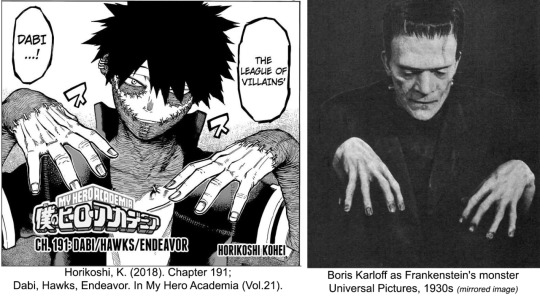
So I've been a "Frankenstein, and I do mean the book not the movies, influenced BNHA" truther for years. I think what should be debated is whether Horikoshi read the original or not, and how much Ito's 2018 adaptation influenced the manga.
I personally think if not the book, what he did read was Junji Ito's adaptation of it. Apparently Ito's manga is a very faithful adaption, which means a lot of the really amazing lines Shelley wrote and themes are in there, and I personally think they fit it better than the Universal Pictures attempt at Frankenstein, which was kind of a "low-brow" adaptation of Shelley's work. Horikoshi has long been a Junji Ito fan - our first panel of Tomura at USJ is an Ito homage, and I've spoken at length about how Hawks's mother is another shoutout to the great master of Horror manga, being named for one of his most popular characters.

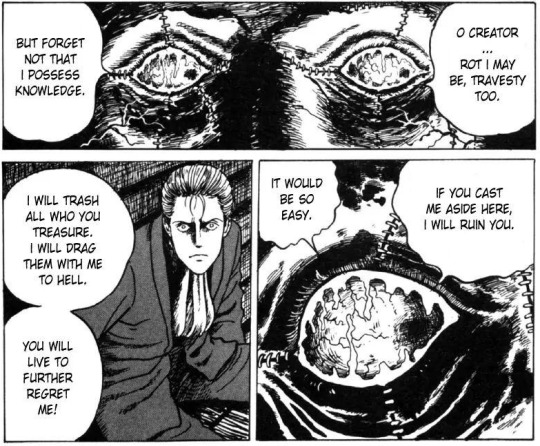
So, yeah, I think you can see the influence pretty clearly. I have a franken!dabi one-shot somewhere because I felt the influence way back when I got into this manga years ago, and I think it still holds up. I'm just not sure if we can say he hasn't read the original even outside this adaptation, because as far as I know, it's a fairly popular book in Japan as well and the first Japanese translation came out in 1953.
Anyway, this is making me feel guilty about not working on my league meta where I essentially partition the entire meta with Frankenstein quotes.... Have one last Frankenstein panel with a parallel.


#dabi#todoroki touya#bnha#dabi is frankenstein's monster#junji ito's frankenstein#frankenstein's monster#meta#asks
223 notes
·
View notes
Text
Naoki Urasawa's manga "Monster" Interview;
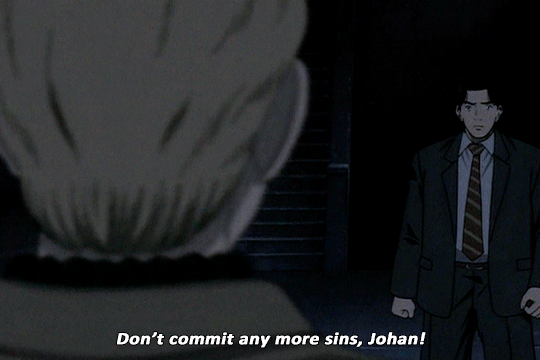
Naoki Urasawa is one of the most successful manga artists in Japan, having not only been awarded the most important prizes in Japan, but also in Germany. He celebrated his international breakthrough with the thriller series "Monster", which he drew in the 90s. It's about a Japanese neurosurgeon in Düsseldorf who saves the life of a boy and gives up his career to do it - actually he should have operated on the mayor instead of the boy - and then gets into real trouble because he is involved in a series of serial murders and a conspiracy device.
Andrea Heinze : How did you come up with the idea for the series?
Naoki Urasawa: The drama “Monster” was created because I really liked the novel “Frankenstein”. That really interested me and I thought about whether I could bring the story into today. The second aspect was that at that time in the USA there was this film with Harrison Ford, “The Fugitive”. It was about a doctor whose wife was killed and I really liked it. And then I thought, I have to do something that involves a doctor who is being chased and has to solve a mystery. And then I was interested in “Frankenstein,” this old Gothic landscape, and I wanted to bring the two together somehow. And then we somehow came across Germany.
Blonde boy as a contrast to evil Germany
I heard that people saying Johan was inspired by Hannibal and other psychopathic characters etc but it never make sense to me. (Maybe some characteristic sides makes sense but generally no, he is different). It makes sense that Monster is inspired by Frankenstein story because Johan is portrayed as more like someone who became the way he is because of his past. He is the monster created by the real monster. (Mostly its Franz Bonaparta who stole his and many others name, biggest sin a person can do). Its really combined between two stories because Tenma wasnt/isnt wrong to save Johan.
Heinze: And what does Germany have to do with it?
Urasawa: I wanted to do something dark. And I don't want to say that Germany is the root of all evil. But if you look at the Second World War - and this is present in Japan, also because Japan was an ally of Germany at the time - there were a lot of dark stories in Germany and also in Japan. A lot has been clarified. But some things don't. I also came up with this beautiful, blonde, blue-eyed boy as a character. I think that's a good contrast to contrast with this dark, bad thing. And the more you delve into history, the more clear it becomes that the roots of the conflicts lie in the Second World War. If you add all of that up, the manga could only take place in Germany.
I am glad that real life stories was brought up but its really sad that this actually happenned somewhere.
Heinze: How did you research the story for “Monster”?
Urasawa : I watched a lot of documentaries. In the 1990s there were also reports of neo-Nazi attacks on houses where Turks lived. I've seen things like that and they've also found their way into my story. I made up the rest. For example, the boy, Johann. He is raised in a children's home where many human experiments take place. And shortly before I finished my work "Monster," there was a documentary on Japanese television about the end of the Nazi era, and it also reported on a camp in which blonde, blue-eyed young people were herded together and essentially had to undergo elite training . And this boy who was depicted there was also called Johannes. I was then asked if I had known all of this before - but that wasn't true, it was all in my imagination.
A person becomes a monster
This is insane....chills. Its so ironic that a lot of people remember Johan's character as some evil psychopath but not only he isnt written that way in story but also, his origin is literally coming from actual victim, a child. Intentional or unconciously or maybe coincidence but still, wow.
Heinze: How is it that Prague also became the setting for the story?
Urasawa: Because everything that was east of Germany, all the Eastern European countries, was not even known in Japan in the 1990s. It's completely different today, but back then people hardly knew everything that lay east of Germany. While on the other hand, Germany and everything further west was already developed for tourism. And Eastern Europe had never been featured in the manga until then. It also fascinated and really attracted me as an illustrator. If you go to Germany or France, it is much brighter in the evenings. But if you go further east, in my case it was Prague, it was much darker on the streets in the evenings in the mid-90s. And I wanted to explore this darkness, this night, for myself.
No wonder story feels so real, with both its characters and places.
Heinze: What does the manga “Monster” have to do with Mary Shelly’s novel “Frankenstein”?
Urasawa : Frankenstein is about a scientist who created a monster, and it's also about human responsibility. There are certainly things that humans are allowed to do and that they perhaps shouldn't be able to do. These thoughts can certainly be taken further, and that's what I did in the "Monster" series. It's about the Japanese doctor who saved a boy, and later the boy becomes a monster, a murderer. And then the doctor asks himself whether he is not responsible for the fact that this boy has become a murderer. This is a different conflict than in "Frankenstein", but the question of responsibility for one's own actions is also an issue in "Monster".
Dostoyevsky novel using the means of manga
Though, story is inspired by Frankeinstein, Tenma is clearly right to save kid's life. He isnt the 'evil' doctor who is responsible for the monster. He is the real doctor who saves this boy from destruction at the end.
Heinze : For me, this doctor is an ideal example of the good in people. He even saves this boy against the wishes of the clinic management, who would much rather use their best surgeon to operate on the mayor.
Urasawa: Every good person has places somewhere in their hearts that are perhaps not so good, and it was the same with Doctor Hämmer - in the hospital there were also some disagreements with the management, where he also thought: "Preferably I would like it if everyone were dead." And later Johann also tells him: "I have fulfilled what you wished for." Then the idea came to him that he had also caused all of this and was to blame for it. And I wanted to show in my work that there is something good and something bad in every person, and that is just human nature. Also, what I didn't mention: There is the classic manga "Astroboy" by Osamu Tezuka in Japan. There is a scientist whose son died and he then creates a robot that looks like his son and that also has feelings. But somehow he says: "You are not my son." At some point he neglects this robot. This scientist is basically Doctor Tenma. So “Frankenstein” and “Astro Boy” are the two sides that belong closely together. I especially consider the artist Tezuka with his classic “Astro Boy” to be my roots.
Here's the real message of Monster, that noone is just a monster and every person has monster in them and that story, Tenma is being parallels with father who neglects his son...I wonder is it him realizing that he was never supposed to kill Johan (the son), he was right to save him, trying to kill him is the neglect/him failing to understand him and end up saving him. Maybe i am reaching but its makes more sense that way. Btw i love how Tenma visits Johan even at the end. Despite everything, they really give that father-son energy.
Heinze: Osamu Tezuka is considered the founder of modern manga, what do you like about him?
Urasawa: It's hard to say in one word. Maybe you can describe it like this: The manga were initially comics for children. But Tezuka did it differently, he practically wrote something like a Dostoyevsky novel, but using the means of manga. Something much deeper, and ultimately it's not about justice winning, but it goes even deeper, practically conveying the feeling that even winning can bring with it something sad and empty. This is something deeper. And he was able to convey that in the beginning of the manga.
Statements made by our conversation partners reflect their own views. Deutschlandfunk does not adopt statements made by its interlocutors in interviews and discussions.
Its really deep story.
This is the source of this interview, i really wanted to make comment/analyze about it.
#naoki urasawa's monster meta#monster naoki urasawa#monster meta#johan liebert#tenma kenzo#interview#naoki urasawa#monster#frankenstein#crossover meta
50 notes
·
View notes
Text
Okay I'm not platforming ridiculous SJ stans' delusions on my blog, but the spirit of Peerless Cucumber possessed me, so I'm piling up my responses here:
---
Shen Jiu's red string was definitely with Yue Qingyuan, which is made clear in the last lines of their extra:
Threads of blood unfurled, extending outward. Right before they should have converged into one, they passed each other by.
...though I guess maybe it's not very obvious from this translation. So as a normal and sane person I'm pulling out og Chinese:
血线蔓延,就在即将汇聚成一结时,错了开来。
断了。
and offering my own TL, which is more clunky to preserve the sentence structure:
Threads of blood spread out; then, within an inch of converging together to become one knot, staggered apart.
They stopped.
The symbolism in this line goes like this:
First of all, flowing blood is described as 线, threads, which is exactly the same 线 as in 红线, red string.
结, knot, is interesting because as a verb, it can mean "to form a relationship", and as a noun, it can mean both physical knot (like the two threads can form tied together) and emotional knot.
I translated 开 as "apart", but it can also mean "to unfasten", "to come loose".
And lastly, 断. It can mean "to stop", but it can also mean "to break off", "to snap", "to be severed". Important to note that in Madam Meiyin's quote @zykamiliah brought up in their response to the og post, "This thread has been cut…", the same word, 断, is used: "这红线断得……"
So their "threads" could tie together into the "knot", but it "came loose", "snapped" in the end. This is the situation in PIDW, after Yue Qingyuan's death; in SVSSS, the thread is snapped, of course, with Shen Jiu's death instead. But the use of the same word clearly indicates it was meant to be the same thread.
---
Also I've looked through the comments and saw another just plain incorrect take, which I already ran into a while ago but didn't argue against, figuring someone else would. I guess nobody did - so let's put it to rest now, at least.
The idea is that since Airplane said that the plot of SVSSS was "distorted [..] right back to the outline [he] discarded" and that after the ending "everything that [he] wanted to write has already played out before [him]" (both quotes from ch.21 of eng.edition), that means that OG PIDW was meant to have bingjiu endgame.
But this is, in fact, plainly disproved in Airplane extras (ch.26 part 4 in eng.edition, emphasis mine):
【 Basic completion of Proud Immortal Demon Way’s original outline achieved (slight deviation in romance plotline); objective complete. Retrieving function to return to original world; download complete. Activate Return Home sequence? 】
Basic completion of the original outline? That he agreed with. All the holes that needed to be filled had been filled. But this “slight deviation of romance plot” wasn’t quite right. Bing-ge was now fully gay; how could you say that was a “slight deviation”? Ah, fine, fine, in fact, in his original outline, Bing-ge hadn’t even had a romance plotline; he had been doomed to fade away, alone and unaging forever. If you insisted on adding a romance plotline, all right, that was whatever, so putting aside all the System’s rambling…this meant he could return to his original world?!
So: Bing-ge originally wasn't meant to have an endgame ship at all. The return to the og outline, then, refers to plot events such as return of Tianlang-jun, revealing the truth about Su Xiyan's fate, and the merging of realms being avoided ("As Shang Qinghua had planned in his outline, Mai Gu Ridge exploded into a mass of flying sand and countless pieces of rubble, with roiling smoke and clouds of billowing dust." - also ch.26 part 4). BingQiu relationship were a deviation, but one Airplane didn't care about much, especially given everything that went right (according to his creative vision) as a result.
---
Also, while I find the mere notion that Binghe could have a red thread with Shen Jiu ridiculous and undeserving of an argument, I did type out a response to vent, so here it is, under cut.
PIDW Luo Binghe did not have a red thread with Shen Jiu, because if he did, Madam Meiyin would've divined that for him - same as she told him about his wives and their preferences with full accuracy in PIDW, and same as she gave SY!SQQ an accurate description of Binghe despite himself not being aware of his feelings in SVSSS.
And when it comes to SVSSS!Luo Binghe, Shen Jiu in this 'verse didn't do anything to change his fate with Binghe. They were heading down the same course. Shen Yuan was the one who changed the narrative, the genre, and Luo Binghe's life; so of course it's him with whom that red thread formed.
And, yes, to return to QiJiu's thread metaphor, it actually describes the red thread not as something permanent, but as something that can be tied together or snap - depending on circumstances. If Luo Binghe had a red thread with Shen Jiu and not Shen Yuan, wouldn't it have frayed and broke off once Shen Jiu was dead, same as the other red string Madam Meiyin saw?
Also, I want to point out that when Madam Meiyin describes "Shen Qingqiu's" fated person, there are descriptors such as "You have both saved each other’s lives" and "Perhaps they may endure short periods of separation, but they quickly reunite". Not only had Shen Jiu never saved Luo Binghe's life - and in fact several times deliberately put his life in danger - but he was also dead for well over a hundred years by the end of PIDW. On the other hand, Shen Yuan has taken multiple blows for Binghe, and their longest separation was five years - after which SY immediately gravitated right back into Luo Binghe's orbit. So which Shen do those lines describe then hmmm i wonder..... /sarcasm
Also, as a last nail, how does Bing-ge's situation fit into the idea that it was SJ? Are you telling me he gleefully tortured his soulmate to death, then ~200 years later met a random guy who just happened to occupy his soulmate's body, and it was the random guy that gave him a bi(?) awakening, made him beg the man to choose him/come with him, and made him cry? Does this make a shred of sense to you, be honest.
#the reason shit like this pisses me off btw is because i like shen jiu as hes written in canon (both tragic and awful)#and i like bing(ge)jiu as a ship if its built on their canon personalities - like there is so much STUFF to explore there. the#frankenstein/creature dynamic of it all. the we are both so fucking broken only we can understand each other. the#guy who was abandoned x guy who will never leave him alone (but unfortunately he hates him. unless?) thing too. BUT#pretending sj was not who he was so you can make bingjiu thats exactly like bingyuan!bq except i guess with more whump fodder for one half#(at best. but im not swinging at THAT hornets nest rn) really aint fucking it and does disservice to all characters involved.#svsss#svsss meta#shen jiu
77 notes
·
View notes